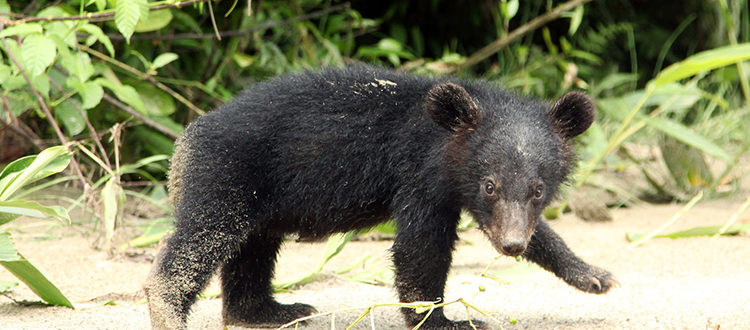Learning to Live Wild: Three Rescued Bear Cubs Continue their Journey towards Wild Rehabilitation
[acx_slideshow name=”CBRC Three Cubs 25092017″]
Pakke Tiger Reserve, Arunachal Pradesh, September 25, 2017: Three orphaned Asiatic black bear cubs that had been shifted to a pre-release site at Doimukh in the Khari Pong area of Pakke Tiger Reserve last month are doing well in their new surroundings, according to recent reports from the field.
Rescued earlier this year, the cubs (two males named Ro-1 and Ro-2 and a female named Yalo) are being hand-raised by a team of experts from the Centre for Bear Rehabilitation and Conservation – CBRC; a rescue, treatment and rehabilitation facility for Asiatic black bears established in Pakke by IFAW-WTI and the Arunachal Forest Department. They were shifted to Doimukh on August 18 as part of CBRC’s ‘assisted release’ protocol, which requires that they be thoroughly acclimatised to the wild environment prior to their eventual release.
Animal keepers Aman Biri, Duluk Dagang and Lakhiram Bhuyan are acting as foster mothers to the cubs, taking them on routine wild walks that allow them to explore their natural habitat, try different types of foods, and gradually develop the survival skills they will need to live independently in the forest. The cubs’ health is being monitored by CBRC veterinarian Dr Rinku Gohain while Nilmani Rabha, the centre’s field biologist, is overseeing the rehabilitation process.
IFAW-WTI animal keepers are acting as foster mothers to the cubs, taking them on routine wild walks that allow them to develop their wild instincts.
“The cubs were shifted to this location deep inside Pakke following a successful health screening by Dr Gohain”, says Nilmani. “Before transporting them here we had created a makeshift cage on a tree for their safety. They are now being taken for walks to develop their instinctive skills in the wild, returning to the cage at night. This process will continue as per CBRC’s bear rehabilitation protocol. Eventually, when we are satisfied that they are sufficiently independent, they will be radio collared and released. The radio collars will help us monitor their life in the wild.”
All three cubs are below six months of age. They are curious and playful, exploring the taste of different types of leaves and wild fruits, climbing trees and fighting one another. They swim across the Kheri River during their daily outings and, given Pakke’s hot and humid weather at the moment, seem to enjoy their time in the water a lot. The animal keepers give them the liberty to explore their surroundings, watching from a distance but ready to step in and protect them in case something untoward happens.
“It’s a fascinating experience for all of us as well”, Nilmani says, “to be able to witness the instinctive behaviour of these rescued animals. They are born to be wild; watching them go back to the wild is a wonderful thing.”









